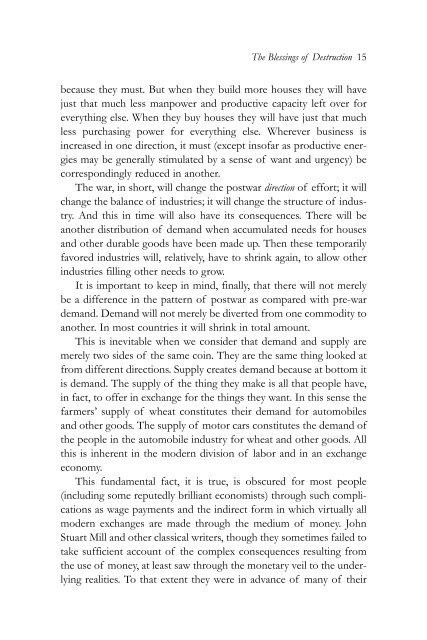1gDdM7w
1gDdM7w
1gDdM7w
- No tags were found...
Create successful ePaper yourself
Turn your PDF publications into a flip-book with our unique Google optimized e-Paper software.
The Blessings of Destruction 15because they must. But when they build more houses they will havejust that much less manpower and productive capacity left over foreverything else. When they buy houses they will have just that muchless purchasing power for everything else. Wherever business isincreased in one direction, it must (except insofar as productive energiesmay be generally stimulated by a sense of want and urgency) becorrespondingly reduced in another.The war, in short, will change the postwar direction of effort; it willchange the balance of industries; it will change the structure of industry.And this in time will also have its consequences. There will beanother distribution of demand when accumulated needs for housesand other durable goods have been made up. Then these temporarilyfavored industries will, relatively, have to shrink again, to allow otherindustries filling other needs to grow.It is important to keep in mind, finally, that there will not merelybe a difference in the pattern of postwar as compared with pre-wardemand. Demand will not merely be diverted from one commodity toanother. In most countries it will shrink in total amount.This is inevitable when we consider that demand and supply aremerely two sides of the same coin. They are the same thing looked atfrom different directions. Supply creates demand because at bottom itis demand. The supply of the thing they make is all that people have,in fact, to offer in exchange for the things they want. In this sense thefarmers’ supply of wheat constitutes their demand for automobilesand other goods. The supply of motor cars constitutes the demand ofthe people in the automobile industry for wheat and other goods. Allthis is inherent in the modern division of labor and in an exchangeeconomy.This fundamental fact, it is true, is obscured for most people(including some reputedly brilliant economists) through such complicationsas wage payments and the indirect form in which virtually allmodern exchanges are made through the medium of money. JohnStuart Mill and other classical writers, though they sometimes failed totake sufficient account of the complex consequences resulting fromthe use of money, at least saw through the monetary veil to the underlyingrealities. To that extent they were in advance of many of their


